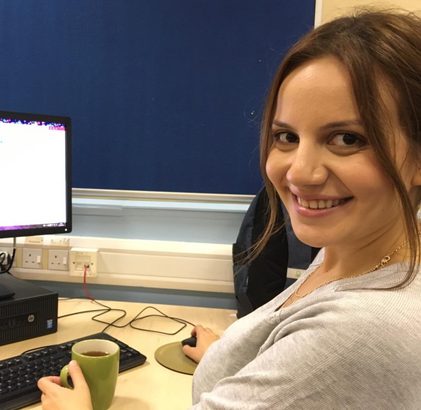The first of a new series of profiles of educators, researchers and students - sharing what it is about a Froebelian approach to early childhood education that inspires them in their work.
Fatma Busra Aksoy-Kumru has been sponsored by the Turkish Government, Ministry of National Education to complete a PhD titled, "Investigating children’s participation in a Froebelian context".
Busra is currently based at The University of Edinburgh and her research is still in progress. We asked her a few questions about her Froebelian journey...
Q: When and how did you first come across the work and principles of Froebel?
Busra: I knew that Froebel was the founder of the Kindergarten. However, I had never come across a setting that adopts Froebel’s principles. During my MSc at the University of Edinburgh, I conducted fieldwork in a Froebelian nursery context. It was an incidental choice, not a pre-planned focus on Froebelian pedagogy for my MSc thesis. However, I was fascinated with the close connection between children and practitioners in a harmonious way in that particular Froebelian context. This led me to explore more about the work and principles of Froebel, who had a rich understanding of childhood and pedagogy.
Q: Why did you want to focus your PhD on a Froebelian approach to early childhood education?
Busra: Children’s rights in early childhood is my particular research interest. Reading through Froebel’s philosophy of early childhood education, I became deeply involved in his conceptualisation of childhood and the meaningful connection with the families and practitioners around children’s needs and interests. From a socio-historical perspective, his philosophy of children as agents and contributors to society was revolutionary and contrasted starkly with the adult-centric views that permeated the children’s lived experiences in Froebel’s time. Looking from that lens, I started to make some clear connections between Froebel’s thoughts and the current discussions of children’s participation rights in their everyday lives. This led me to explore Froebel’s pedagogy in-depth with a particular focus on children’s participation as their right.
Q: Tell us a little about current practice and approaches to early childhood education in your home country of Turkey...
Busra: There is an ever-growing interest in early childhood education and pedagogies in Turkey – both academically and politically. Academic research offers discussions and debates around various pedagogical approaches that nurture more eclectic views of early childhood education in Turkey. They offer a new avenue to explore more about Froebelian influences both in the historical perspectives and in the contemporary practices of early years contexts.
From a political perspective, the focus is fundamentally on providing high quality education for children under 6 years. There are even fascinating nationwide projects to make early childhood education compulsory for under 3s. However, the strong emphasis on academic achievement and ‘readiness’ for school is worthy of consideration in terms of the lived experiences of children, families and practitioners in Turkey.
PhD Bursaries
Did you know that the Froebel Trust PhD bursary scheme can support students undertaking research with a Froebelian focus?
Find out morePlay, essentially, opens up many avenues for children to freely express themselves and prioritise children’s wishes and concerns for practitioners.
Explore the Froebel Trust research library
The Froebel Trust online research library features all our funded early childhood research and practice development projects. Search the library by keyword, subject and theme...
Learn more

